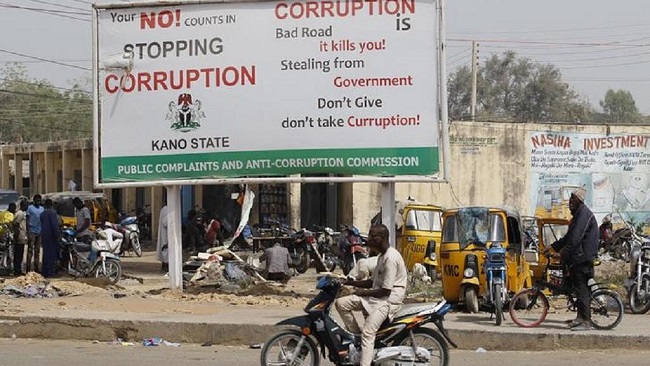1, June 2018
Nigeria: Conviction of former governor boosts anti-corruption hopes 0
The conviction of former governor Jolly Nyame has boosted hopes of change in Nigeria which has battled against corruption for a long time.
Nigerian lawyers and activists on Thursday welcomed the jailing of a former state governor for corruption, hoping it will set a precedent for a string of other high-profile suspects.
Jolly Nyame was sentenced to 14 years’ jail on Wednesday for looting millions of dollars as governor of northeastern Taraba state between 1999 and 2007.
The judge at the court in Abuja condemned his crimes, which included inflated contracts for office equipment and stationery, “outright theft”. Nyame, a church pastor, was one of more than a dozen governors who left office in 2007.
They were questioned at the end of their tenures by the Economic and Financial Crimes Commission (EFCC).
Theirs and dozens of other high-profile graft cases, some dating back to the early 2000s, are still before the courts, having been delayed by repeated adjournments.
‘Conviction will boost anti-corruption efforts’
But EFCC spokesman Wilson Uwujaren said Nyame’s conviction would boost anti-corruption efforts and potentially help to speed up pending cases.
“There are a number of former governors still being prosecuted by the EFCC for corruption,” he told AFP. “Some of the cases have progressed substantially.’‘
“With the diligence of the EFCC in prosecuting these cases, hopefully the nation will witness more conviction of former political office holders.”
The Buhari factor?
President Muhammadu Buhari, a no-nonsense former military ruler, has vowed to recover what he said were “mind-boggling” sums of public money looted by officials over decades.
The Nigerian statesman is the African Union’s anti-corruption champion, with the continental body having chosen to dedicate this year 2018 to the fight against the vice.
The EFCC, the country’s main anti-corruption agency, has been at the forefront of efforts to stamp out the practice, and has brought dozens of high-profile individuals to court.
But with many of them members of the former administration of Goodluck Jonathan and his Peoples Democratic Party, Buhari has been accused of conducting a political witchhunt.
The conviction of Nyame whose prosecution began before Buhari took office, and the renewed spotlight on the other outstanding cases from more than a decade ago indicate that corruption is not just a recent phenomenon.
Two years ago, Buhari’s government claimed just 55 people stole more than $6 billion between 2006 and 2013.
Nigeria’s highest-ranking judge, Chief Justice Walter Onnoghen, has instructed courts to devote more time to hearing corruption cases across the country.
AFP


















1, June 2018
Uganda imposes tax on social media use 0
Uganda’s parliament has imposed a tax on the use of social media in a bid to raise revenue but opponents of the law say it aims to stifle criticism of President Yoweri Museveni, who has been in power since 1986.
Users will be charged 200 shillings ($0.0531) per day for services such as Facebook, Twitter and WhatsApp. That amounts to around $19 per year in a country where gross domestic product per capita was around $615 in 2016, according to World Bank figures.
The tax was passed on Wednesday as part of an overhaul of an excise duty law due to take effect next financial year which starts in July, parliament spokesman Chris Obore told Reuters.
A junior finance minister previously told journalists the tax would be levied daily by mobile phone operators on each SIM card used to access any of the targeted social media platforms.
There was no immediate comment from cell phone operators or social media companies, but rights advocates denounced the move.
“It (tax) is a new tool of stifling free expression and citizen organising that has been beyond the control of the state,” said Nicholas Opiyo, a Kampala-based lawyer who also heads a local rights organisation.
“It’s intended to curtail the ever increasing central role of social media in political organising,” he said.
A government spokesman did not return a call seeking comment but authorities have previously denied such accusations.
About 40 percent of Uganda’s 40 million people use the internet, according to data from the regulating body Uganda Communications Commission. Facebook and WhatsApp are widely used in Uganda and many other African countries.
Digital advocacy group the World Wide Web Foundation says data costs in Africa are among the world’s highest, a fact blamed for slow internet penetration and limited use even for those connected.
“Data right now is essential in nearly every worker’s day to day business, a responsible government should be lowering its price not the opposite,” said Diana Taremwa, a charity worker in the capital Kampala.
Critics of Museveni, 73, say his government employs a wide array of tactics to limit political debate, trample on civil rights and stifle the opposition.
Museveni has won a series of elections but his opponents say these have been rigged in his favour. His main rival, Kizza Besigye, has been jailed dozens of times since he first run against him in 2001.
Some opposition critics have in the past been charged for allegedly insulting him in posts on Facebook.
In the last presidential election in 2016, authorities also blocked access to Facebook, Twitter and WhatsApp saying the platforms would be used by the opposition to mobilise protests. ($1 = 3,770.0000 Ugandan shillings)
(Source: Reuters)